上一期指路:
从第八期讲到的JobMaster的启动,直到后面第九期到第十一期都是基于下图的分支①,那么我们继续分析分支②,也就是说TaskExecutor向SlotManager注册slot后,SlotManager分配slot告诉TaskExecutor去提供slot给JobMaster,JobMaster就可以提交执行任务到TaskExecutor的slot中去执行了。
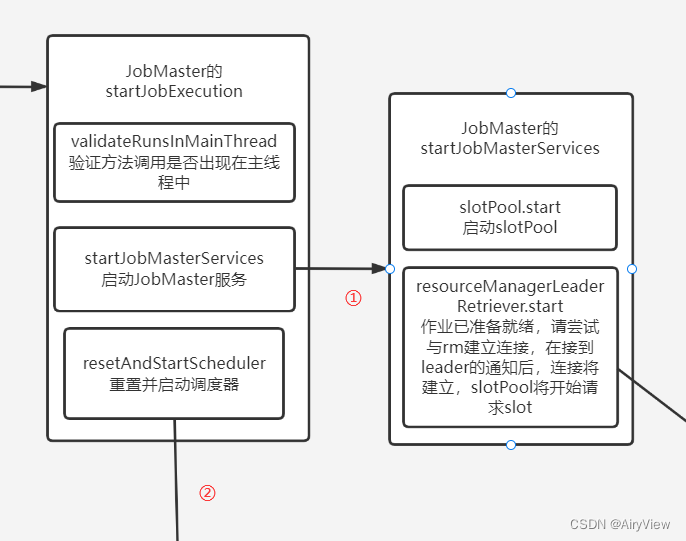
1.一系列套娃般的跳转
JobMaster#resetAndStartScheduler->JobMaster#startScheduling->SchedulerBase#startScheduling->DefaultScheduler#startSchedulingInternal->
PipelinedRegionSchedulingStrategy#startScheduling(默认的调度策略是PipelinedRegionSchedulingStrategy:以流水线的局部为粒度进行调度 )->PipelinedRegionSchedulingStrategy#maybeScheduleRegions->PipelinedRegionSchedulingStrategy#maybeScheduleRegion->DefaultScheduler#allocateSlotsAndDeploy
public void allocateSlotsAndDeploy(final List<ExecutionVertexDeploymentOption> executionVertexDeploymentOptions) {
validateDeploymentOptions(executionVertexDeploymentOptions);
final Map<ExecutionVertexID, ExecutionVertexDeploymentOption> deploymentOptionsByVertex =
groupDeploymentOptionsByVertexId(executionVertexDeploymentOptions);
final List<ExecutionVertexID> verticesToDeploy = executionVertexDeploymentOptions.stream()
.map(ExecutionVertexDeploymentOption::getExecutionVertexId)
.collect(Collectors.toList());
final Map<ExecutionVertexID, ExecutionVertexVersion> requiredVersionByVertex =
executionVertexVersioner.recordVertexModifications(verticesToDeploy);
transitionToScheduled(verticesToDeploy);
final List<SlotExecutionVertexAssignment> slotExecutionVertexAssignments =
allocateSlots(executionVertexDeploymentOptions);
final List<DeploymentHandle> deploymentHandles = createDeploymentHandles(
requiredVersionByVertex,
deploymentOptionsByVertex,
slotExecutionVertexAssignments);
waitForAllSlotsAndDeploy(deploymentHandles);
}①allocateSlots(executionVertexDeploymentOptions)
为给定的executor分配slot
②waitForAllSlotsAndDeploy
等待所有的slot分配完并开始部署
2.DefaultScheduler#waitForAllSlotsAndDeploy->DefaultScheduler#deployAll->DefaultScheduler#deployOrHandleError->DefaultScheduler#deployTaskSafe->DefaultExecutionVertexOperations#deploy->ExecutionVertex#deploy->Execution#deploy
public void deploy() throws JobException {
assertRunningInJobMasterMainThread();
final LogicalSlot slot = assignedResource;
checkNotNull(slot, "In order to deploy the execution we first have to assign a resource via tryAssignResource.");
// Check if the TaskManager died in the meantime
// This only speeds up the response to TaskManagers failing concurrently to deployments.
// The more general check is the rpcTimeout of the deployment call
if (!slot.isAlive()) {
throw new JobException("Target slot (TaskManager) for deployment is no longer alive.");
}
// make sure exactly one deployment call happens from the correct state
// note: the transition from CREATED to DEPLOYING is for testing purposes only
ExecutionState previous = this.state;
if (previous == SCHEDULED || previous == CREATED) {
if (!transitionState(previous, DEPLOYING)) {
// race condition, someone else beat us to the deploying call.
// this should actually not happen and indicates a race somewhere else
throw new IllegalStateException("Cannot deploy task: Concurrent deployment call race.");
}
}
else {
// vertex may have been cancelled, or it was already scheduled
throw new IllegalStateException("The vertex must be in CREATED or SCHEDULED state to be deployed. Found state " + previous);
}
if (this != slot.getPayload()) {
throw new IllegalStateException(
String.format("The execution %s has not been assigned to the assigned slot.", this));
}
try {
// race double check, did we fail/cancel and do we need to release the slot?
if (this.state != DEPLOYING) {
slot.releaseSlot(new FlinkException("Actual state of execution " + this + " (" + state + ") does not match expected state DEPLOYING."));
return;
}
LOG.info("Deploying {} (attempt #{}) with attempt id {} to {} with allocation id {}", vertex.getTaskNameWithSubtaskIndex(),
attemptNumber, vertex.getCurrentExecutionAttempt().getAttemptId(), getAssignedResourceLocation(), slot.getAllocationId());
if (taskRestore != null) {
checkState(taskRestore.getTaskStateSnapshot().getSubtaskStateMappings().stream().allMatch(entry ->
entry.getValue().getInputRescalingDescriptor().equals(InflightDataRescalingDescriptor.NO_RESCALE) &&
entry.getValue().getOutputRescalingDescriptor().equals(InflightDataRescalingDescriptor.NO_RESCALE)),
"Rescaling from unaligned checkpoint is not yet supported.");
}
final TaskDeploymentDescriptor deployment = TaskDeploymentDescriptorFactory
.fromExecutionVertex(vertex, attemptNumber)
.createDeploymentDescriptor(
slot.getAllocationId(),
slot.getPhysicalSlotNumber(),
taskRestore,
producedPartitions.values());
// null taskRestore to let it be GC'ed
taskRestore = null;
final TaskManagerGateway taskManagerGateway = slot.getTaskManagerGateway();
final ComponentMainThreadExecutor jobMasterMainThreadExecutor =
vertex.getExecutionGraph().getJobMasterMainThreadExecutor();
getVertex().notifyPendingDeployment(this);
// We run the submission in the future executor so that the serialization of large TDDs does not block
// the main thread and sync back to the main thread once submission is completed.
CompletableFuture.supplyAsync(() -> taskManagerGateway.submitTask(deployment, rpcTimeout), executor)
.thenCompose(Function.identity())
.whenCompleteAsync(
(ack, failure) -> {
if (failure == null) {
vertex.notifyCompletedDeployment(this);
} else {
if (failure instanceof TimeoutException) {
String taskname = vertex.getTaskNameWithSubtaskIndex() + " (" + attemptId + ')';
markFailed(new Exception(
"Cannot deploy task " + taskname + " - TaskManager (" + getAssignedResourceLocation()
+ ") not responding after a rpcTimeout of " + rpcTimeout, failure));
} else {
markFailed(failure);
}
}
},
jobMasterMainThreadExecutor);
}
catch (Throwable t) {
markFailed(t);
if (isLegacyScheduling()) {
ExceptionUtils.rethrow(t);
}
}
}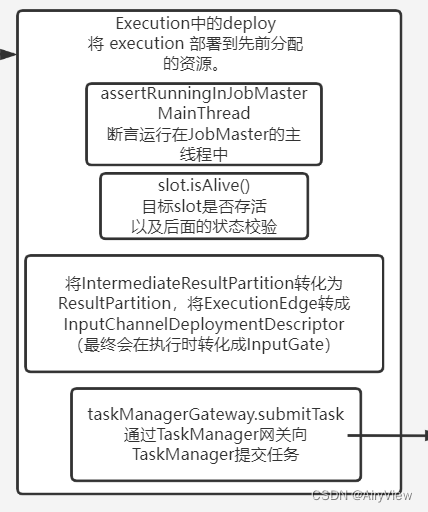
3. RpcTaskManagerGateway#submitTask->TaskExecutor#submitTask
public CompletableFuture<Acknowledge> submitTask(
TaskDeploymentDescriptor tdd,
JobMasterId jobMasterId,
Time timeout) {
try {
final JobID jobId = tdd.getJobId();
final ExecutionAttemptID executionAttemptID = tdd.getExecutionAttemptId();
final JobTable.Connection jobManagerConnection = jobTable.getConnection(jobId).orElseThrow(() -> {
final String message = "Could not submit task because there is no JobManager " +
"associated for the job " + jobId + '.';
log.debug(message);
return new TaskSubmissionException(message);
});
if (!Objects.equals(jobManagerConnection.getJobMasterId(), jobMasterId)) {
final String message = "Rejecting the task submission because the job manager leader id " +
jobMasterId + " does not match the expected job manager leader id " +
jobManagerConnection.getJobMasterId() + '.';
log.debug(message);
throw new TaskSubmissionException(message);
}
if (!taskSlotTable.tryMarkSlotActive(jobId, tdd.getAllocationId())) {
final String message = "No task slot allocated for job ID " + jobId +
" and allocation ID " + tdd.getAllocationId() + '.';
log.debug(message);
throw new TaskSubmissionException(message);
}
// re-integrate offloaded data:
try {
tdd.loadBigData(blobCacheService.getPermanentBlobService());
} catch (IOException | ClassNotFoundException e) {
throw new TaskSubmissionException("Could not re-integrate offloaded TaskDeploymentDescriptor data.", e);
}
// deserialize the pre-serialized information
final JobInformation jobInformation;
final TaskInformation taskInformation;
try {
jobInformation = tdd.getSerializedJobInformation().deserializeValue(getClass().getClassLoader());
taskInformation = tdd.getSerializedTaskInformation().deserializeValue(getClass().getClassLoader());
} catch (IOException | ClassNotFoundException e) {
throw new TaskSubmissionException("Could not deserialize the job or task information.", e);
}
if (!jobId.equals(jobInformation.getJobId())) {
throw new TaskSubmissionException(
"Inconsistent job ID information inside TaskDeploymentDescriptor (" +
tdd.getJobId() + " vs. " + jobInformation.getJobId() + ")");
}
TaskMetricGroup taskMetricGroup = taskManagerMetricGroup.addTaskForJob(
jobInformation.getJobId(),
jobInformation.getJobName(),
taskInformation.getJobVertexId(),
tdd.getExecutionAttemptId(),
taskInformation.getTaskName(),
tdd.getSubtaskIndex(),
tdd.getAttemptNumber());
InputSplitProvider inputSplitProvider = new RpcInputSplitProvider(
jobManagerConnection.getJobManagerGateway(),
taskInformation.getJobVertexId(),
tdd.getExecutionAttemptId(),
taskManagerConfiguration.getTimeout());
final TaskOperatorEventGateway taskOperatorEventGateway = new RpcTaskOperatorEventGateway(
jobManagerConnection.getJobManagerGateway(),
executionAttemptID,
(t) -> runAsync(() -> failTask(executionAttemptID, t)));
TaskManagerActions taskManagerActions = jobManagerConnection.getTaskManagerActions();
CheckpointResponder checkpointResponder = jobManagerConnection.getCheckpointResponder();
GlobalAggregateManager aggregateManager = jobManagerConnection.getGlobalAggregateManager();
LibraryCacheManager.ClassLoaderHandle classLoaderHandle = jobManagerConnection.getClassLoaderHandle();
ResultPartitionConsumableNotifier resultPartitionConsumableNotifier = jobManagerConnection.getResultPartitionConsumableNotifier();
PartitionProducerStateChecker partitionStateChecker = jobManagerConnection.getPartitionStateChecker();
final TaskLocalStateStore localStateStore = localStateStoresManager.localStateStoreForSubtask(
jobId,
tdd.getAllocationId(),
taskInformation.getJobVertexId(),
tdd.getSubtaskIndex());
final JobManagerTaskRestore taskRestore = tdd.getTaskRestore();
final TaskStateManager taskStateManager = new TaskStateManagerImpl(
jobId,
tdd.getExecutionAttemptId(),
localStateStore,
taskRestore,
checkpointResponder);
MemoryManager memoryManager;
try {
memoryManager = taskSlotTable.getTaskMemoryManager(tdd.getAllocationId());
} catch (SlotNotFoundException e) {
throw new TaskSubmissionException("Could not submit task.", e);
}
Task task = new Task(
jobInformation,
taskInformation,
tdd.getExecutionAttemptId(),
tdd.getAllocationId(),
tdd.getSubtaskIndex(),
tdd.getAttemptNumber(),
tdd.getProducedPartitions(),
tdd.getInputGates(),
tdd.getTargetSlotNumber(),
memoryManager,
taskExecutorServices.getIOManager(),
taskExecutorServices.getShuffleEnvironment(),
taskExecutorServices.getKvStateService(),
taskExecutorServices.getBroadcastVariableManager(),
taskExecutorServices.getTaskEventDispatcher(),
externalResourceInfoProvider,
taskStateManager,
taskManagerActions,
inputSplitProvider,
checkpointResponder,
taskOperatorEventGateway,
aggregateManager,
classLoaderHandle,
fileCache,
taskManagerConfiguration,
taskMetricGroup,
resultPartitionConsumableNotifier,
partitionStateChecker,
getRpcService().getExecutor());
taskMetricGroup.gauge(MetricNames.IS_BACKPRESSURED, task::isBackPressured);
log.info("Received task {} ({}), deploy into slot with allocation id {}.",
task.getTaskInfo().getTaskNameWithSubtasks(), tdd.getExecutionAttemptId(), tdd.getAllocationId());
boolean taskAdded;
try {
taskAdded = taskSlotTable.addTask(task);
} catch (SlotNotFoundException | SlotNotActiveException e) {
throw new TaskSubmissionException("Could not submit task.", e);
}
if (taskAdded) {
task.startTaskThread();
setupResultPartitionBookkeeping(
tdd.getJobId(),
tdd.getProducedPartitions(),
task.getTerminationFuture());
return CompletableFuture.completedFuture(Acknowledge.get());
} else {
final String message = "TaskManager already contains a task for id " +
task.getExecutionId() + '.';
log.debug(message);
throw new TaskSubmissionException(message);
}
} catch (TaskSubmissionException e) {
return FutureUtils.completedExceptionally(e);
}
}4.Task#startTaskThread->Task实现了Runnable 接口,启动线程之后就会调用线程run方法,即task中的run->Task#doRun
private void doRun() {
// ----------------------------
// Initial State transition
// ----------------------------
while (true) {
ExecutionState current = this.executionState;
if (current == ExecutionState.CREATED) {
if (transitionState(ExecutionState.CREATED, ExecutionState.DEPLOYING)) {
// success, we can start our work
break;
}
}
else if (current == ExecutionState.FAILED) {
// we were immediately failed. tell the TaskManager that we reached our final state
notifyFinalState();
if (metrics != null) {
metrics.close();
}
return;
}
else if (current == ExecutionState.CANCELING) {
if (transitionState(ExecutionState.CANCELING, ExecutionState.CANCELED)) {
// we were immediately canceled. tell the TaskManager that we reached our final state
notifyFinalState();
if (metrics != null) {
metrics.close();
}
return;
}
}
else {
if (metrics != null) {
metrics.close();
}
throw new IllegalStateException("Invalid state for beginning of operation of task " + this + '.');
}
}
// all resource acquisitions and registrations from here on
// need to be undone in the end
Map<String, Future<Path>> distributedCacheEntries = new HashMap<>();
AbstractInvokable invokable = null;
try {
// ----------------------------
// Task Bootstrap - We periodically
// check for canceling as a shortcut
// ----------------------------
// activate safety net for task thread
LOG.debug("Creating FileSystem stream leak safety net for task {}", this);
FileSystemSafetyNet.initializeSafetyNetForThread();
// first of all, get a user-code classloader
// this may involve downloading the job's JAR files and/or classes
LOG.info("Loading JAR files for task {}.", this);
userCodeClassLoader = createUserCodeClassloader();
final ExecutionConfig executionConfig = serializedExecutionConfig.deserializeValue(userCodeClassLoader.asClassLoader());
if (executionConfig.getTaskCancellationInterval() >= 0) {
// override task cancellation interval from Flink config if set in ExecutionConfig
taskCancellationInterval = executionConfig.getTaskCancellationInterval();
}
if (executionConfig.getTaskCancellationTimeout() >= 0) {
// override task cancellation timeout from Flink config if set in ExecutionConfig
taskCancellationTimeout = executionConfig.getTaskCancellationTimeout();
}
if (isCanceledOrFailed()) {
throw new CancelTaskException();
}
// ----------------------------------------------------------------
// register the task with the network stack
// this operation may fail if the system does not have enough
// memory to run the necessary data exchanges
// the registration must also strictly be undone
// ----------------------------------------------------------------
LOG.info("Registering task at network: {}.", this);
setupPartitionsAndGates(consumableNotifyingPartitionWriters, inputGates);
for (ResultPartitionWriter partitionWriter : consumableNotifyingPartitionWriters) {
taskEventDispatcher.registerPartition(partitionWriter.getPartitionId());
}
// next, kick off the background copying of files for the distributed cache
try {
for (Map.Entry<String, DistributedCache.DistributedCacheEntry> entry :
DistributedCache.readFileInfoFromConfig(jobConfiguration)) {
LOG.info("Obtaining local cache file for '{}'.", entry.getKey());
Future<Path> cp = fileCache.createTmpFile(entry.getKey(), entry.getValue(), jobId, executionId);
distributedCacheEntries.put(entry.getKey(), cp);
}
}
catch (Exception e) {
throw new Exception(
String.format("Exception while adding files to distributed cache of task %s (%s).", taskNameWithSubtask, executionId), e);
}
if (isCanceledOrFailed()) {
throw new CancelTaskException();
}
// ----------------------------------------------------------------
// call the user code initialization methods
// ----------------------------------------------------------------
TaskKvStateRegistry kvStateRegistry = kvStateService.createKvStateTaskRegistry(jobId, getJobVertexId());
Environment env = new RuntimeEnvironment(
jobId,
vertexId,
executionId,
executionConfig,
taskInfo,
jobConfiguration,
taskConfiguration,
userCodeClassLoader,
memoryManager,
ioManager,
broadcastVariableManager,
taskStateManager,
aggregateManager,
accumulatorRegistry,
kvStateRegistry,
inputSplitProvider,
distributedCacheEntries,
consumableNotifyingPartitionWriters,
inputGates,
taskEventDispatcher,
checkpointResponder,
operatorCoordinatorEventGateway,
taskManagerConfig,
metrics,
this,
externalResourceInfoProvider);
// Make sure the user code classloader is accessible thread-locally.
// We are setting the correct context class loader before instantiating the invokable
// so that it is available to the invokable during its entire lifetime.
executingThread.setContextClassLoader(userCodeClassLoader.asClassLoader());
// now load and instantiate the task's invokable code
invokable = loadAndInstantiateInvokable(userCodeClassLoader.asClassLoader(), nameOfInvokableClass, env);
// ----------------------------------------------------------------
// actual task core work
// ----------------------------------------------------------------
// we must make strictly sure that the invokable is accessible to the cancel() call
// by the time we switched to running.
this.invokable = invokable;
// switch to the RUNNING state, if that fails, we have been canceled/failed in the meantime
if (!transitionState(ExecutionState.DEPLOYING, ExecutionState.RUNNING)) {
throw new CancelTaskException();
}
// notify everyone that we switched to running
taskManagerActions.updateTaskExecutionState(new TaskExecutionState(jobId, executionId, ExecutionState.RUNNING));
// make sure the user code classloader is accessible thread-locally
executingThread.setContextClassLoader(userCodeClassLoader.asClassLoader());
// run the invokable
invokable.invoke();
// make sure, we enter the catch block if the task leaves the invoke() method due
// to the fact that it has been canceled
if (isCanceledOrFailed()) {
throw new CancelTaskException();
}
// ----------------------------------------------------------------
// finalization of a successful execution
// ----------------------------------------------------------------
// finish the produced partitions. if this fails, we consider the execution failed.
for (ResultPartitionWriter partitionWriter : consumableNotifyingPartitionWriters) {
if (partitionWriter != null) {
partitionWriter.finish();
}
}
// try to mark the task as finished
// if that fails, the task was canceled/failed in the meantime
if (!transitionState(ExecutionState.RUNNING, ExecutionState.FINISHED)) {
throw new CancelTaskException();
}
}
catch (Throwable t) {
// unwrap wrapped exceptions to make stack traces more compact
if (t instanceof WrappingRuntimeException) {
t = ((WrappingRuntimeException) t).unwrap();
}
// ----------------------------------------------------------------
// the execution failed. either the invokable code properly failed, or
// an exception was thrown as a side effect of cancelling
// ----------------------------------------------------------------
TaskManagerExceptionUtils.tryEnrichTaskManagerError(t);
try {
// check if the exception is unrecoverable
if (ExceptionUtils.isJvmFatalError(t) ||
(t instanceof OutOfMemoryError && taskManagerConfig.shouldExitJvmOnOutOfMemoryError())) {
// terminate the JVM immediately
// don't attempt a clean shutdown, because we cannot expect the clean shutdown to complete
try {
LOG.error("Encountered fatal error {} - terminating the JVM", t.getClass().getName(), t);
} finally {
Runtime.getRuntime().halt(-1);
}
}
// transition into our final state. we should be either in DEPLOYING, RUNNING, CANCELING, or FAILED
// loop for multiple retries during concurrent state changes via calls to cancel() or
// to failExternally()
while (true) {
ExecutionState current = this.executionState;
if (current == ExecutionState.RUNNING || current == ExecutionState.DEPLOYING) {
if (t instanceof CancelTaskException) {
if (transitionState(current, ExecutionState.CANCELED)) {
cancelInvokable(invokable);
break;
}
}
else {
if (transitionState(current, ExecutionState.FAILED, t)) {
// proper failure of the task. record the exception as the root cause
failureCause = t;
cancelInvokable(invokable);
break;
}
}
}
else if (current == ExecutionState.CANCELING) {
if (transitionState(current, ExecutionState.CANCELED)) {
break;
}
}
else if (current == ExecutionState.FAILED) {
// in state failed already, no transition necessary any more
break;
}
// unexpected state, go to failed
else if (transitionState(current, ExecutionState.FAILED, t)) {
LOG.error("Unexpected state in task {} ({}) during an exception: {}.", taskNameWithSubtask, executionId, current);
break;
}
// else fall through the loop and
}
}
catch (Throwable tt) {
String message = String.format("FATAL - exception in exception handler of task %s (%s).", taskNameWithSubtask, executionId);
LOG.error(message, tt);
notifyFatalError(message, tt);
}
}
finally {
try {
LOG.info("Freeing task resources for {} ({}).", taskNameWithSubtask, executionId);
// clear the reference to the invokable. this helps guard against holding references
// to the invokable and its structures in cases where this Task object is still referenced
this.invokable = null;
// free the network resources
releaseResources();
// free memory resources
if (invokable != null) {
memoryManager.releaseAll(invokable);
}
// remove all of the tasks resources
fileCache.releaseJob(jobId, executionId);
// close and de-activate safety net for task thread
LOG.debug("Ensuring all FileSystem streams are closed for task {}", this);
FileSystemSafetyNet.closeSafetyNetAndGuardedResourcesForThread();
notifyFinalState();
}
catch (Throwable t) {
// an error in the resource cleanup is fatal
String message = String.format("FATAL - exception in resource cleanup of task %s (%s).", taskNameWithSubtask, executionId);
LOG.error(message, t);
notifyFatalError(message, t);
}
// un-register the metrics at the end so that the task may already be
// counted as finished when this happens
// errors here will only be logged
try {
metrics.close();
}
catch (Throwable t) {
LOG.error("Error during metrics de-registration of task {} ({}).", taskNameWithSubtask, executionId, t);
}
}
}①while (true)
任务状态转换
②createUserCodeClassloader
获取用户代码类加载器
③loadAndInstantiateInvokable
现在,加载并实例化task的可调用代码
④taskManagerActions.updateTaskExecutionState
通知所有人我们状态切换为RUNNING了
⑤invokable.invoke()
调用执行
5.StreamTask#invoke->StreamTask#runMailboxLoop->MailboxProcessor#runMailboxLoop->(点击runDefaultAction)StreamTask中的构造方法中的new MailboxProcessor的第一个参数this::processInput对应默认行为->StreamTask#processInput->StreamOneInputProcessor中的processInput->StreamTaskNetworkInput#emitNext
public InputStatus emitNext(DataOutput<T> output) throws Exception {
while (true) {
// get the stream element from the deserializer
if (currentRecordDeserializer != null) {
DeserializationResult result = currentRecordDeserializer.getNextRecord(deserializationDelegate);
if (result.isBufferConsumed()) {
currentRecordDeserializer.getCurrentBuffer().recycleBuffer();
currentRecordDeserializer = null;
}
if (result.isFullRecord()) {
processElement(deserializationDelegate.getInstance(), output);
return InputStatus.MORE_AVAILABLE;
}
}
Optional<BufferOrEvent> bufferOrEvent = checkpointedInputGate.pollNext();
if (bufferOrEvent.isPresent()) {
// return to the mailbox after receiving a checkpoint barrier to avoid processing of
// data after the barrier before checkpoint is performed for unaligned checkpoint mode
if (bufferOrEvent.get().isBuffer()) {
processBuffer(bufferOrEvent.get());
} else {
processEvent(bufferOrEvent.get());
return InputStatus.MORE_AVAILABLE;
}
} else {
if (checkpointedInputGate.isFinished()) {
checkState(checkpointedInputGate.getAvailableFuture().isDone(), "Finished BarrierHandler should be available");
return InputStatus.END_OF_INPUT;
}
return InputStatus.NOTHING_AVAILABLE;
}
}
}从反序列化器中获取流元素并调用processElement,一看到这个函数名字,就想起了自己编程时自定义processFunction中需要重写的processElement函数
6.StreamTaskNetworkInput#processElement->OneInputStreamTask中的内部类StreamTaskNetworkOutput#emitRecord->StreamMap#processElement
public void processElement(StreamRecord<IN> element) throws Exception {
output.collect(element.replace(userFunction.map(element.getValue())));
}以map操作为例子,很明显底层调用了用户自定义mapFunction中重写的map方法,把原数据替换成用户经过该map操作后期望得到的数据并使用collect输出。
总览
本期涉及到的代码的流程图如下:
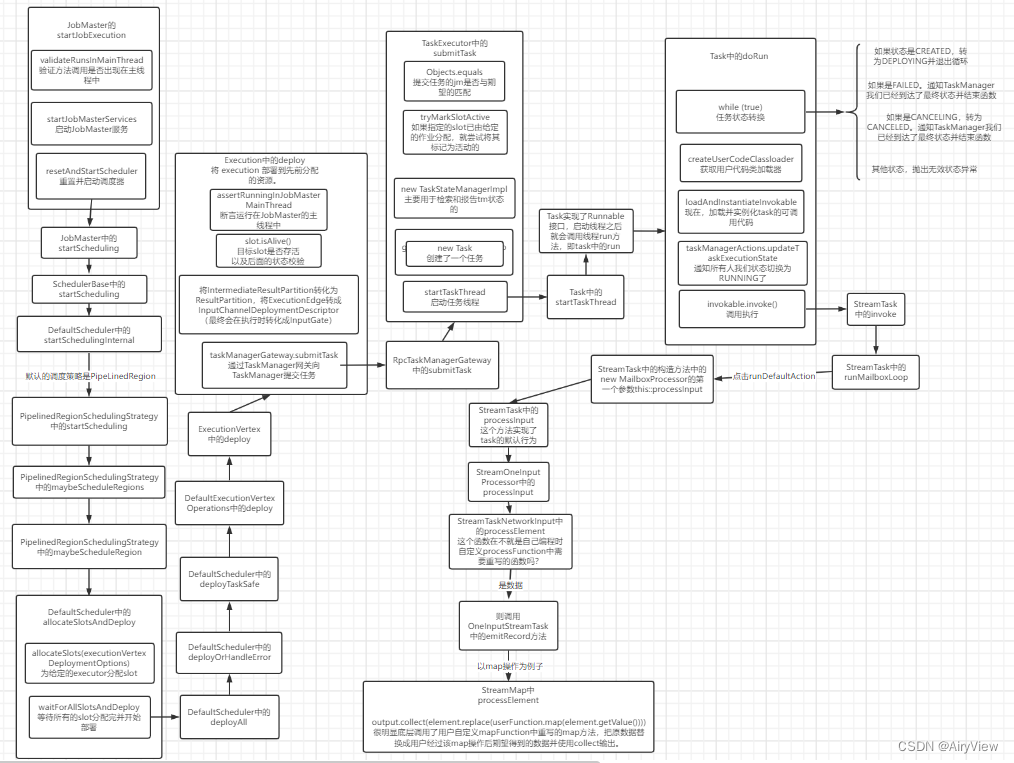








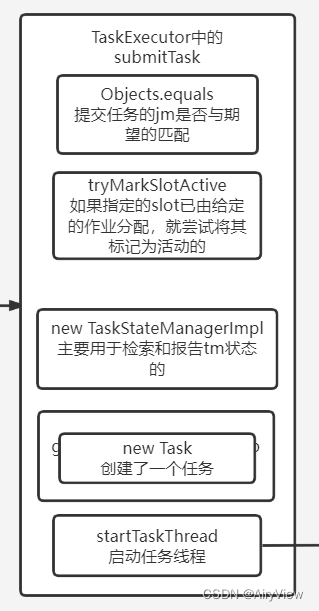
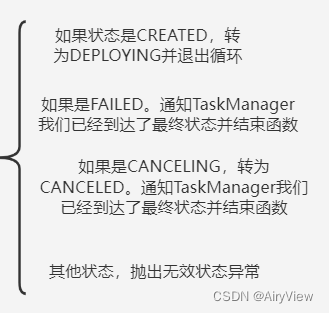













 3799
3799











 被折叠的 条评论
为什么被折叠?
被折叠的 条评论
为什么被折叠?








